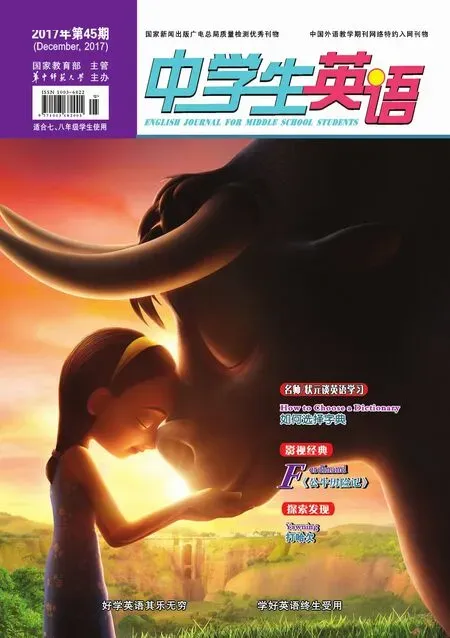如何選擇字典
廣西自治區(qū)賀州高級(jí)中學(xué) 陳延洲 編譯
Most people have used a dictionary of some sort.All dictionaries are not created equal.The dictionary you should choose depends on your needs.Here are some things to consider before you choose a dictionary.
大部分人都用過(guò)字典。所有的字典都不盡相同。你要根據(jù)自己的需求來(lái)選擇字典。你在選擇之前,有以下幾點(diǎn)需要考慮:
1.Know what general sort of dictionary you need.Here are the basics you should decide before you begin looking∶
1.了解你所需的字典大概是屬于哪個(gè)類型。在你開(kāi)始尋找前,有幾個(gè)基本要點(diǎn)必須先決定好:
◎Languages.Are you looking for a dictionary in English,with definitions1in English?Are you looking for a translating dictionary,a book that will allow you to look up words in your language and find words in another language?
◎語(yǔ)言。你要找一本用英語(yǔ)來(lái)釋義的英語(yǔ)字典嗎?還是想找一本翻譯字典,一本可以用你自己的母語(yǔ)查單詞,又可以用來(lái)找到外語(yǔ)中對(duì)應(yīng)單詞的字典呢?
◎Size.For print dictionaries,will you be carrying this dictionary with you in a pocket, purse,or briefcase or will it remain on a desk or bookshelf somewhere?
◎大小。對(duì)于印刷版字典,你隨身帶著的時(shí)候是放在口袋里、手提包里還是公文包里呢?或者就把它放在書桌、書架的某個(gè)地方?
◎Scope2.Do you want a general dictionary?Do you want a dictionary that includes technical terms or terms relating to a particular field or specialty3?Some dictionaries specialize4in words pertaining5to certain subjects,such as music or law.
◎范圍。你想要一本通用字典么?或者一本包含科技術(shù)語(yǔ)或與某個(gè)領(lǐng)域、專業(yè)相關(guān)的術(shù)語(yǔ)的字典?有些字典會(huì)詳細(xì)解釋與某個(gè)領(lǐng)域相關(guān)的詞,比如音樂(lè)或法律。
◎Binding6.Do you care if your dictionary is hardcover or paperback?Do you prefer a book that will stay open by itself,or do you mind holding the pages open while you use it?
◎裝訂。你介意你的字典是精裝本還是平裝本嗎?你喜歡書自己保持打開(kāi)的狀態(tài)么?或者說(shuō)你介不介意在使用的時(shí)候讓書頁(yè)一直攤開(kāi)呢?
◎Print or digital format7.Printed dictionaries require no electricity to operate.On the other hand,they are updated only by purchasing a new one.
◎印刷版或是數(shù)碼版。印刷版字典不需要電就能用。從另一方面來(lái)說(shuō),要更新內(nèi)容就只能再買一本新的。
2.Look for newer words.New words enter the language all the time.Ask yourself,does the dictionary include current technology and computer terms?
2.查找最新的詞。語(yǔ)言中會(huì)一直出現(xiàn)新詞。問(wèn)問(wèn)自己,你的字典包括最新的技術(shù)和計(jì)算機(jī)術(shù)語(yǔ)嗎?
3.Look for proper nouns.Does the dictionary mention Arizona?Does it mention important people?
3.查找專有名詞。你的字典里收錄了亞利桑那州相關(guān)詞匯么?有沒(méi)有提到任何重要人物呢?
4.Examine the reference matter at the front and back.Does it have a pronunciation key?Do you understand it and know how to use it?Did you have to read the pronunciation key,or could you make a pretty good guess?If it is a translating dictionary,does it include a usage section or a phrasebook section?Are these features8that you will use when using this dictionary?
4.查下字典前后的正文附頁(yè)。有沒(méi)有發(fā)音表?你能看懂并知道怎么運(yùn)用這個(gè)表么?你必須照著發(fā)音表才會(huì)讀,還是說(shuō)你能猜對(duì)讀音?如果用的是一本翻譯字典,那它包括用法部分或常用手冊(cè)部分嗎?使用這本字典的時(shí)候,你會(huì)使用這些特別的部分么?
5.Find out how the dictionary handles9terms with multiple meanings.This is very important in a translating dictionary.In English,word“board”can mean a piece of wood,and it can mean a committee.In most other languages,you will need a bit of guidance to choose the correct translation according to your meaning.
5.看看該字典如何解釋有多重意義的詞語(yǔ)。這點(diǎn)對(duì)于一本翻譯字典來(lái)說(shuō)尤其重要。在英語(yǔ)中,單詞“board”可以指一塊木頭,也可以指委員會(huì)。在其他大部分語(yǔ)言中,你需要一點(diǎn)指導(dǎo)來(lái)選擇對(duì)應(yīng)你的本意的正確翻譯。
6.Notice whether the dictionary includes phrases and idioms and see how it handles them. Again,these can change between regions,so be sure to note if regional differences are mentioned.
6.注意所用的字典是否收錄了短語(yǔ)和習(xí)語(yǔ),并弄清楚字典是如何解釋它們的。再次強(qiáng)調(diào),這些短語(yǔ)和習(xí)語(yǔ)會(huì)因?yàn)榈貐^(qū)的不同而變化,所以一定要注意其中有沒(méi)有提到區(qū)域性的差異。
Notes:

